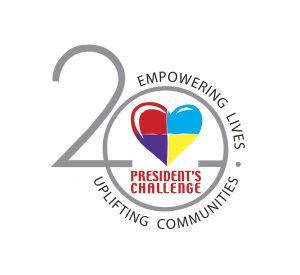Enabling Persons with Disabilities through Job Accommodations
04 May 2021
Learn how a leading hotel group has integrated employees with disabilities through reasonable job accommodations.
Persons with disabilities have skills and abilities that they can offer to the workforce. To maximise their potential in employment, organisations can provide reasonable accommodations for the employees.
Job accommodations are adjustments to the job or work environment that make it possible for employees with disabilities to perform their jobs. They are ‘reasonable’ when they:
1. help persons with disabilities perform essential job functions
2. do not cause undue hardship to the employer or employee, and
3. do not change the fundamental nature of the business.
(Above) Shangri-La Singapore’s Ms Sim Ee Min, Service Manager – Gardens and Landscaping, together with interns from SG Enable’s School-to-Work Transition Programme
There are multiple benefits to employers after making job accommodations, according to an ongoing study on employers since 2004 by the US Job Accommodation Network. These include being able to retain valued employees and increased productivity. In turn, employees with disabilities can perform well and stay on in the job, eliminating the costs of training new employees.
Shangri-La Singapore has hired persons with disabilities since 2010. There are 25 staff with disabilities within the Singapore property. Today, Shangri-La Group has 740 staff with disabilities across its global properties.
More recently, it made various job accommodations when it took in four interns with disabilities, as part of SG Enable’s School-to-Work Transition Programme, which offers customised training pathways and work options for students who have the potential to work, and helps transit graduates from special education schools to employment.
How Shangri-La Singapore Made Reasonable Job Accommodations
Despite the COVID-19 pandemic, when many employers had to retrench staff, Shangri-La Singapore did just the opposite. Through the School-to-Work Transition Programme, the hotel hired four interns with autism and/or intellectual disabilities in June 2020. Both hotel’s staff and SG Enable’s job coaches helped to ensure a safe and pleasant workplace environment for the interns.
Over four months, the interns were rotated between the landscaping, linen, stewarding, and housekeeping departments, as part of an evaluation process to find the right job match.
The supervisors observed their work performance, then identified their unique strengths and abilities before making any necessary workflow adjustments and accommodations. The supervisors soon realised they excelled in tasks requiring structure and attention to detail, such as folding towels and trash bags.
The following job accommodations were also made:
Making Adjustments to Work Tools Used
Certain work tools are necessary to enable employees to perform their jobs more effectively. When the interns were assigned to the landscaping department, they had difficulties connecting the water hose to the garden’s tap. The earlier device used to connect the hose to the taps was a metal ring with sharp edges (Fig 1) – the interns, being new on the job may risk getting cut by these – and the ring needed to be tightened by a screwdriver.
The metal ring was then replaced with a screw-on connector (Fig 2) allowing the interns to operate it without using any other tools and without risk of injury. This enabled them to perform the same job function, while minimising loss in productivity.
Fig 1. Metal Ring
Fig 2. Screw-on connector

Kryan (above) was placed as an intern at Shangri-La Singapore via SG Enable's School-to-Work Transition Programme in June 2020. Kryan eamed praises from his supervisor for his attention to detail. He was rotated from the landscape department (pictured above) to the housekeeping department, where his supervisor also remarked that his quality of work would please even VIP guests.
Implementing Flexible Work Hours
Employers can adjust the way work is delivered based on the abilities of the persons with disabilities. To ease the interns’ transition from school to work, Shangri-La Singapore allowed them to work shorter hours during their initial months, before they embarked on six-hour day shifts after three months into the job. Having the interns gradually get used to the working hours would also help them build their stamina and prepare them for the demands of working life in the future.
Customising Communication for Better Accommodation and Enhanced Natural Support
The hotel adopted customised communication with the interns and other colleagues with disabilities, strengthening their inclusive culture.
Persons with intellectual disabilities generally learn better with simpler instructions, short phrases, and images incorporated into training materials and demonstrations. So the hotel labelled the kitchen cabinets to indicate where various items should be stored. This not only helped the interns, but also benefitted other new staff.
Persons with intellectual disabilities and/or autism tend to remember better through demonstration too. One of the hotel’s security guards taught the interns how they could scan the SafeEntry QR code as part of the safety measures during the pandemic, and over time, they learnt to do so independently.
To enhance its natural support for the interns, Shangri-La Singapore carried out its regular practice of assigning a department supervisor to be attached to the interns. Like a buddy system, this organisation-wide process allows supervisors to get to know new staff better. This helped to ensure a smooth transition upon on-boarding, making them feel safe and supported in the new work environment.
To More Years and Beyond
“These job accommodations did not require big budgets or resources. Instead, it was more about matching job roles and making adjustments to suit the interns’ abilities, with staff support and a commitment to providing an inclusive workplace environment,” shared Mr Tane Picken, General Manager, Shangri-La Singapore.
Shangri-La Singapore has also applied for the Enabling Mark, a national-level accreditation framework by SG Enable that benchmarks and recognises organisations for their best practices and outcomes in disability-inclusive employment. Beyond a decade of disability-inclusive hiring, Shangri-La Singapore hopes to chart new heights and break new grounds in its disability inclusion journey.
If you would like to get started on providing reasonable job accommodations, download a complimentary copy of our Job Accommodation and Workplace Accessibility Guide here.
Supported by:



